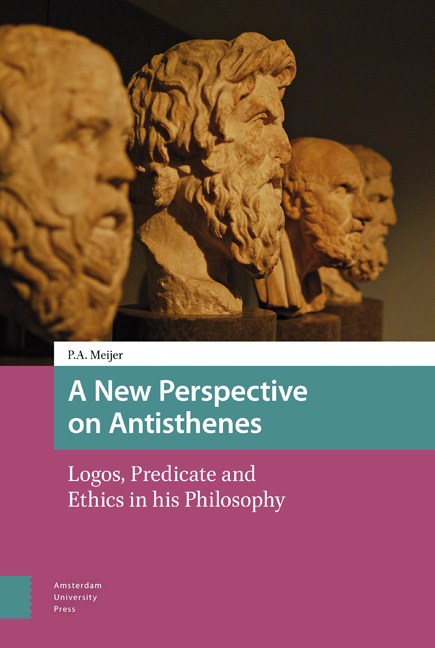Book contents
- Frontmatter
- Dedication
- Contents
- Preface
- Abbreviations
- Primary Sources – Editions Used
- Introduction
- Part I LOGOS AND PREDICATE
- Part II ANTISTHENES’ VIEWS ON THEOLOGY: HIS THEORETICAL APPROACH TO THE STUDY OF HOMER
- Part III ANTISTHENEAN ETHICS
- Epilogue: Antisthenes, an Assessment
- Appendix II The Speeches of Ajax and Odysseus
- Bibliography
- Concordance Giannantoni (SSR) – Caizzi (D.C.)
- Index
Chapter VIII - A portrait of Antisthenes in Xenophon’s Symposium
Published online by Cambridge University Press: 24 December 2020
- Frontmatter
- Dedication
- Contents
- Preface
- Abbreviations
- Primary Sources – Editions Used
- Introduction
- Part I LOGOS AND PREDICATE
- Part II ANTISTHENES’ VIEWS ON THEOLOGY: HIS THEORETICAL APPROACH TO THE STUDY OF HOMER
- Part III ANTISTHENEAN ETHICS
- Epilogue: Antisthenes, an Assessment
- Appendix II The Speeches of Ajax and Odysseus
- Bibliography
- Concordance Giannantoni (SSR) – Caizzi (D.C.)
- Index
Summary
Antisthenes in Xenophon's Symposium
I offer here a discussion of some passages from Xenophon's Symposium in which a portrait of Antisthenes is presented in conversational action. This significant work can be seen as a counterpart to Plato's Symposium, which is far more well known because of its philosophical depth and style. However, it is hard to accept that Xenophon's text was written after Plato’s, although it does not have the grandeur of Plato's unforgettably rich work. Yet, most commentators believe that Plato's was prior. Guthrie, who does not admire Xenophon's Symposium very much, speaks about its ‘naivety’, and says that ‘structurally the composition creaks at every joint’. I am inclined to side with Patzer who says: ‘Es bleibt im Folgenden zu untersuchen, welche Rolle Antisthenes im Rahmen dieser wohldurchdachten und recht kunstvollen dreiteiligen Gesamtkonzeption spielt’. [‘It remains to be investigated in the following what part Antisthenes plays within this well-considered and quite ingenious tripartite composition’].
Antisthenes comes to the scene as a central figure in Xenophon's Symposium; one of the speeches is even given to him. He is the only future philosopher in the company of Socrates and he appears in this capacity as the most dedicated follower. There is reason to believe that Xenophon presented Antisthenes as he thought that he actually was: somewhat rough and very direct. In the Symposium, Socrates himself ascribes such a character to Antisthenes. Patzer assumes the pursuit of realism to be behind this portrait of Antisthenes; he presents a thorough and often convincing commentary on this passage in his chapter ‘Der Xenophontische Antisthenes’.
Xenophon could not have been present at the scene, although he claims that he was there. If he was not present, from where did he derive his material? It is likely that he took some material from memories of his contact with Socrates and from his own reading of works by Antisthenes, who did not write a Symposium himself, although he did write many works that were counterparts of books by Plato. If Antisthenes had written a Symposium (none is mentioned on Diogenes Laertius’ list), he would not have made an acceptable participant in Xenophon's work.
- Type
- Chapter
- Information
- A New Perspective on AntisthenesLogos, Predicate and Ethics in his Philosophy, pp. 149 - 173Publisher: Amsterdam University PressPrint publication year: 2017



